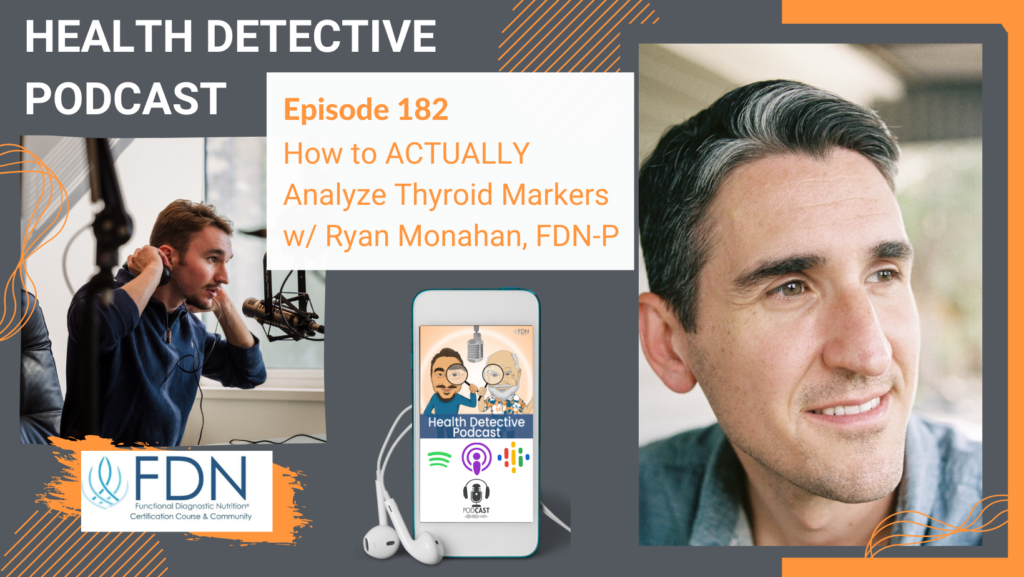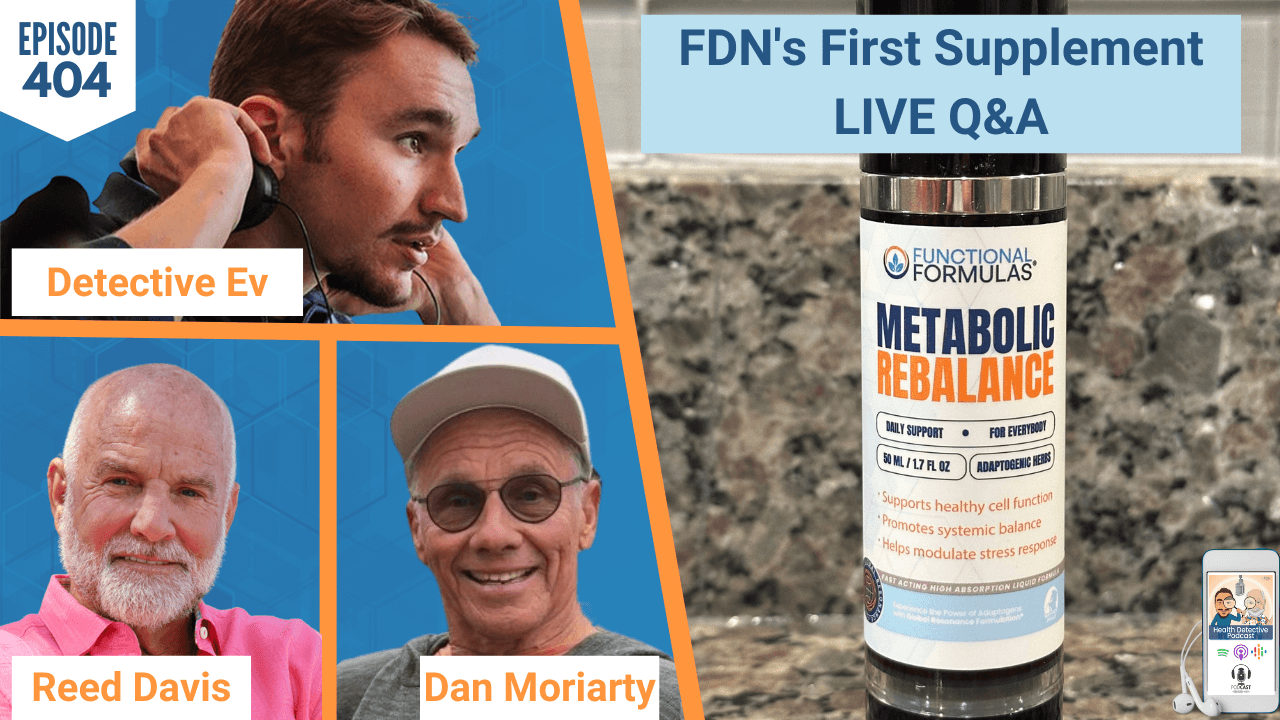Introduction
[00:00:00] Detective Ev: What is going on with my friends? Welcome back to another episode of the Health Detective Podcast by Functional Diagnostic Nutrition. My name is Evan Transue, aka Detective Ev. I will be your host for today’s show about analyzing thyroid markers.
Our special guest for today is actually the person who was the first guest ever on this podcast all the way back in January of 2021. Kind of crazy that this has been going on for almost two years. I cannot wait for that two-year mark.
His name’s Ryan Monahan. He is someone that if you’re in the world of FDN already, you know this guy, you probably love him. If you’re someone who’s just training or are considering the course or whatever, you might not know this guy yet, and that’s completely fine. He’s someone that helps a lot with the graduates, and he’s just a wealth of knowledge.

It’s one of those individuals who does not stop learning ever, but also knows how to execute, and that’s a really fine line. I know a lot of people who execute and don’t continue to learn, and then I know a lot of people who learn infinitely and never actually take the steps necessary to apply what they learned and actually help other people with it. Ryan, at least from my view, seems like a perfect mix of both of these things. I think you guys are really going to enjoy this today.
About Ryan Monahan
Now simply because it’s been so long that he’s been on, over 180 episodes at this point, we do touch on his story a little bit today, very brief summarized version. It’s only going to be like six, seven minutes, and it’s relevant to today’s topic. I think it’s worth listening to anyway. But of course, if you guys want to listen to his original episode – Episode 2, that will be in the show notes for you guys. I do want to read his bio though, and then we will get into this today and explain what we’re actually doing.
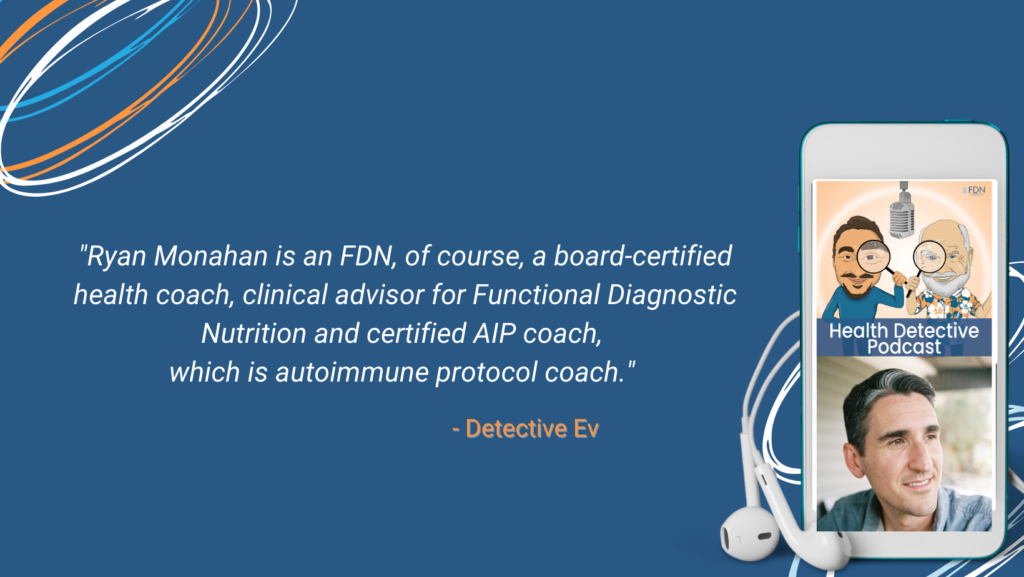
Ryan Monahan is an FDN, of course, a board-certified health coach, clinical advisor for Functional Diagnostic Nutrition and certified AIP coach, which is autoimmune protocol coach. He has a passion for uncovering hidden stressors that contribute to thyroid disease.
Throughout his journey, Ryan spent over 10 frustrating years visiting more than 40 health professionals to find answers to his chronic health complaints until being diagnosed with Hashimoto’s thyroiditis in 2012. Since then, his mission has been to change the dialogue about chronic disease towards a holistic, functional approach, all while helping others restore their health to normal function.
Typically, his clients are people who have struggled with finding relief from their autoimmune symptoms. Oftentimes, they feel that they’ve tried everything, and that traditional medicine hasn’t served them. In his experience, there is a better way, and we’re sure going to talk about that better way today.
Analyzing Thyroid Markers and Their Trends
What we are actually doing is analyzing thyroid labs, and they are the thyroid labs of yours truly. It is a full thyroid panel, well almost full. We’re missing one marker.

We’re going to go through all of these markers, what they actually mean, why they matter, how Western medicine has a slightly different interpretation, and most importantly, how, even though my labs look great today from a functional perspective, there were trends that were starting to be seen on them already.
You can follow us along on the audio just by continuing listening to this podcast, that is totally fine. It will not affect you in any way because we’re going to read out the markers and read out the reference ranges. It’s something that we will say everything verbally for you guys. We’ll make sure it’s covered.
But if you want to see the labs and see the ranges and see our faces, if you are listening to this right now, then this is also Live on our YouTube page at Functional Diagnostic Nutrition. Just search for us on YouTube. I will have this linked in the show notes once the link is available. Without further ado, let’s get to today’s episode.
All right, everyone, we are back with an FDN fan favorite. It’s Ryan Monahan. Women love him. Men want to be him. How are you, my friend? We’re glad to have you back.
[00:03:32] Ryan Monahan: Love the intro. Doing really good. Really happy to be back.
[00:03:38] Detective Ev: The funniest part is we’ve been talking for like 15 minutes and he doesn’t know I’ve been holding this in the whole time and smacked him with it as soon as we went Live.
Doing Great Work Personally & for FDN
Ryan Monahan was the first guest on the Health Detective Podcast. We weren’t even called that back then. We were the FDNthrive Podcast. Now, by the time you’re released, you’re going to be Episode 182, my friend. It’s kind of cool to finally have you back on.
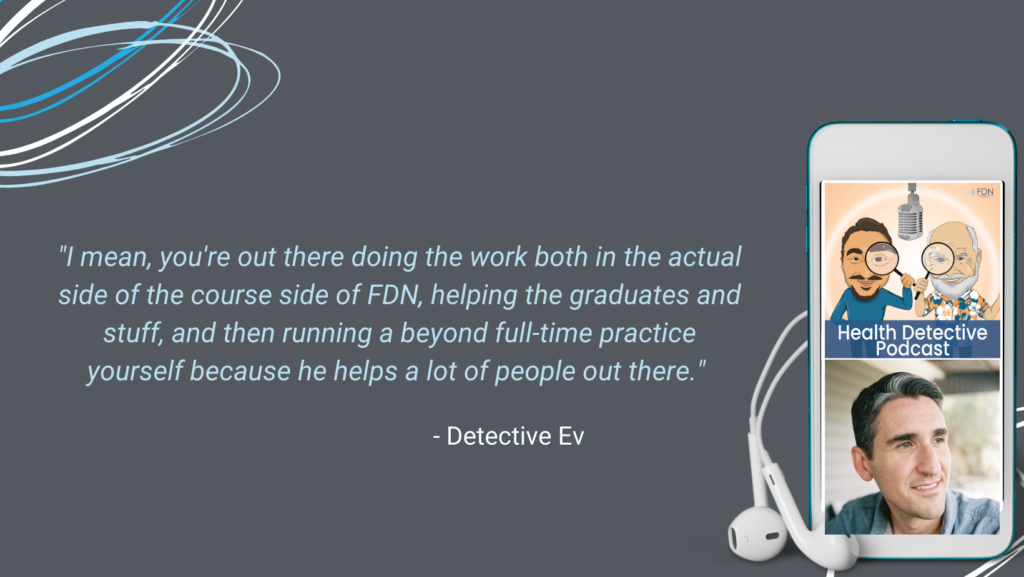
I should have gotten you on way long ago, but I know you’re busy. I mean, you’re out there doing the work both in the actual side of the course side of FDN, helping the graduates and stuff, and then running a beyond full-time practice yourself because he helps a lot of people out there.
We’re glad to have you back.
[00:04:12] Ryan Monahan: Glad to be back. I can’t believe it’s already been 180 guests on the podcast. That’s amazing.
[00:04:18] Detective Ev: Yeah. And some of them are solo episodes to be clear. But we are definitely over a hundred guests, that’s for sure. Cheers to a hundred more. We’re going to keep going and not stopping anytime soon.
If you guys want to hear Ryan’s story, I highly recommend it. The audio quality’s going to be a little funky. There’s no video. It’s primitive times at the FDN podcast. But we had talked a lot about the thyroid things that Ryan dealt with. I encourage you guys; I’m going to have it in the show notes. Go click on that episode – Episode 2, listen to it, check it out.
There’s so many things there that you’d want to hear. But I think for today, just because it has been so long, Ryan, it would be worth just giving a small preface before we dive into our topic today of thyroid stuff and why the labs kind of trick us.
Searching for Answers & Finding None
Then we’re also going to do a screen share. We’re going to be analyzing some labs Live. You’ll be able to check that out on our YouTube if you guys are listening. But it’ll also still be audio friendly. So, you can do either.
But can you just give us a quick story of like, what was going on with the thyroid thing? How did you guys end up finding out that that was a major component of your health?
[00:05:12] Ryan Monahan: I’m happy to give an abridged version of that, kind of a condensed, abridged version.
Basically, had been struggling with chronic health related symptoms for over a decade that started by the time I was a teenager. That included chronic allergies and asthma, depression, constipation that developed into chronic fatigue. By the time I was in my early twenties, I had all kinds of unexplained skin lesions and rashes throughout my body. It was kind of a laundry list of symptoms. It just kind of went on and on.

Throughout that 10-to-20-year period, even, it was a long chunk of time, I had been basically jumping from doctor to doctor, to practitioner to practitioner. I had even attended what’s called a Grand Rounds at Yale-New Haven Hospital. About 40 medical students assessed my health condition in one day. Even still up to that point, still hadn’t found any answers to what was going on with my health.
Throughout my twenties, I lived a very poor and miserable quality of life, dealing with the depression, chronic fatigue. The allergies and asthma were so debilitating that I would wake up every night, pretty much wheezing and not being able to breathe. That was even with the assistance of antihistamines and inhalers.
A Diagnosis That Led to Lifestyle Medicine and FDN
I was just kind of like managing and just getting by. Just sneezing like 50 to a hundred times a day, constantly. Couldn’t get through a conversation without like mucous running down my nose, or sniffling, or sneezing. Also, all this affected my self-esteem, my day-to-day ability to live a normal life.
I started at a certain point to experience a lot of puffiness or edema in the face. So, my biological age, if you look back at pictures of me from the early 2010s, like 2010, 2012, I feel like I look older then than I do now. I actually feel like I’ve been able to reverse my biological age through this kind of functional healing approach. Maybe we could include a before and after picture in the show notes as well.
As it turned out, I’ll keep it short, I was eventually able to find a doctor in the Atlanta area where I was living at the time. He was a traditional medical doctor that was also licensed in traditional Chinese medicine.
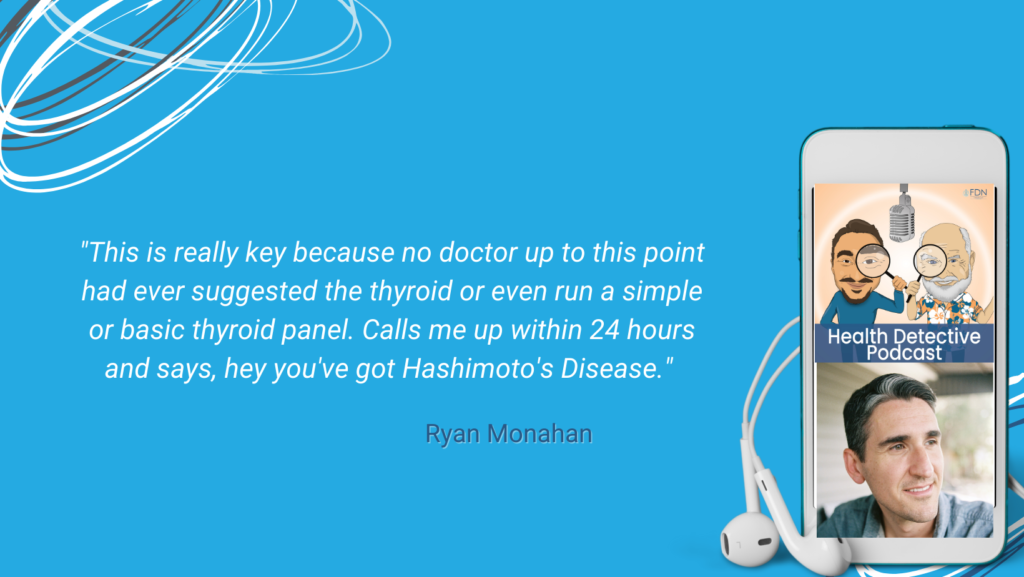
He actually did spend some time with me, and he ran a whole array of labs that no doctor had ever run on me before, including a thyroid panel. This is really key because no doctor up to this point had ever suggested the thyroid or even run a simple or basic thyroid panel. Calls me up within 24 hours and says, hey you’ve got Hashimoto’s Disease.
I’m like, What the heck is that? I’m like, I don’t even know what the thyroid is, let alone this Hashimoto’s character, right? This kind of was the beginning of a journey for me that led into the functional approach to lifestyle medicine and the FDN type approach.
Feeling Better in One Day
I can tell you that it was a huge relief off my shoulders in a weird way, knowing that there was a diagnosis, that there was something wrong. It wasn’t just all in my head. It wasn’t crazy.
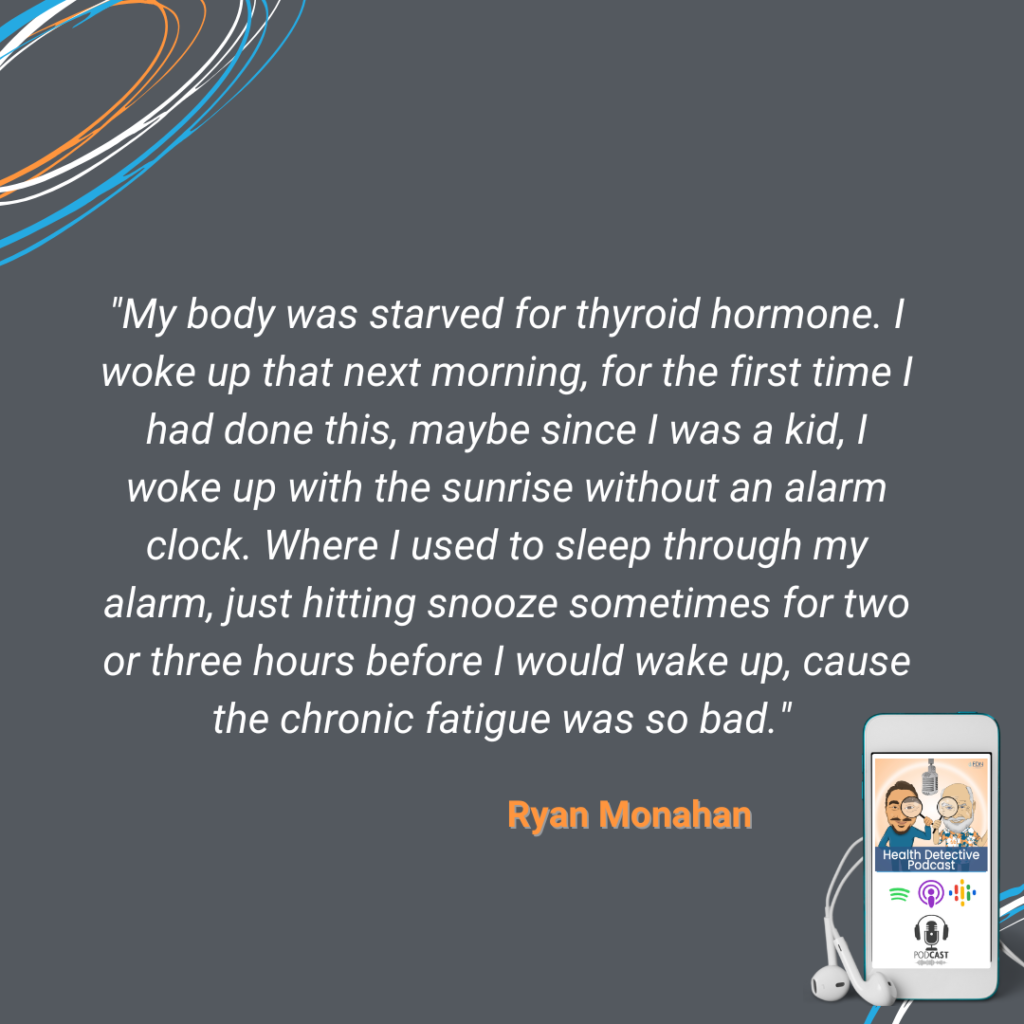
Within one day of getting on thyroid medication, and I say this with no exaggeration, it was overnight, I became a new person. My body was starved for thyroid hormone. I woke up that next morning, for the first time I had done this, maybe since I was a kid, I woke up with the sunrise without an alarm clock. Where I used to sleep through my alarm, just hitting snooze sometimes for two or three hours before I would wake up, cause the chronic fatigue was so bad. So, woke up with a pep in my step. The depression lifted; my energy improved.
From that point on, I was just hungry to learn more. You know, how does the thyroid work? Why does it become dysfunctional? What are the diet and lifestyle factors that are related there? That kind of just led into an obsession, which still lasts today.
[00:09:02] Detective Ev: Thank you. That was like actually a perfect summarized version because I still think there’s a ton of value then in the original podcast if they want the story. But today it shows, okay, this is why we’re talking about this.
It’s amazing. You know, you think, well, I thought at least somehow, how are we going to do all these episodes every week? Like, aren’t we going to run out of topics? Yet here we are talking about something that you would actually think is quite basic in our world.
Thyroid Markers: TSH
There’s so many stories, so many topics that sometimes it takes this long to get to these types of things. I’m glad to have you on today to do it.
One thing I don’t think we even talked about in that story though, and perhaps you were saving it for when we’re actually looking at these individual markers together today, was what your TSH was once you got the thyroid labs back. We’ll dive into it more.
But just for right now, so the audience isn’t like sitting on the edge of their seats, what is like a normal range of TSH and then what was yours at the time, my friend?
[00:09:50] Ryan Monahan: I’m glad you brought that up because it is the most traumatic part of the story.
So TSH, which is Thyroid Stimulating Hormone, that’s what the acronym stands for. The clinical range from a conventional medical perspective is about 0.5 to about five. You might see some variation within that, but that’s typically what you’ll see. From a functional perspective, we want to see that even tighter, about 0.5 to 2.5, maybe even 0.5 to two. Okay.
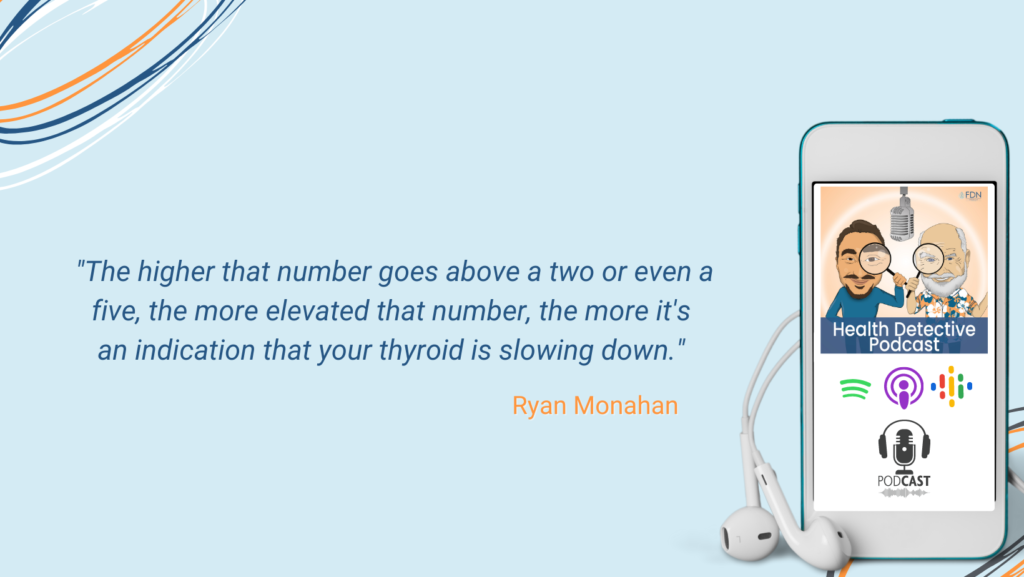
Now, the thing to understand is that this is an inverse marker. It’s a little counterintuitive, but I’ll explain for the audience. The higher that number goes above a two or even a five, the more elevated that number, the more it’s an indication that your thyroid is slowing down. As a result, that’s going to slow down your metabolism, your mood, your energy, your digestion, your body temperature. It’s like the thermostat for the body.
Thyroid Markers: Essentially Like Being in a Metabolic Coma
So, if TSH is elevated, it’s like a thermostat that’s dialed down to like 60 degrees, right? I don’t know who’d want to live in an environment like that, but that’s kind of what’s happening in your body. Just wanted to provide some context there.
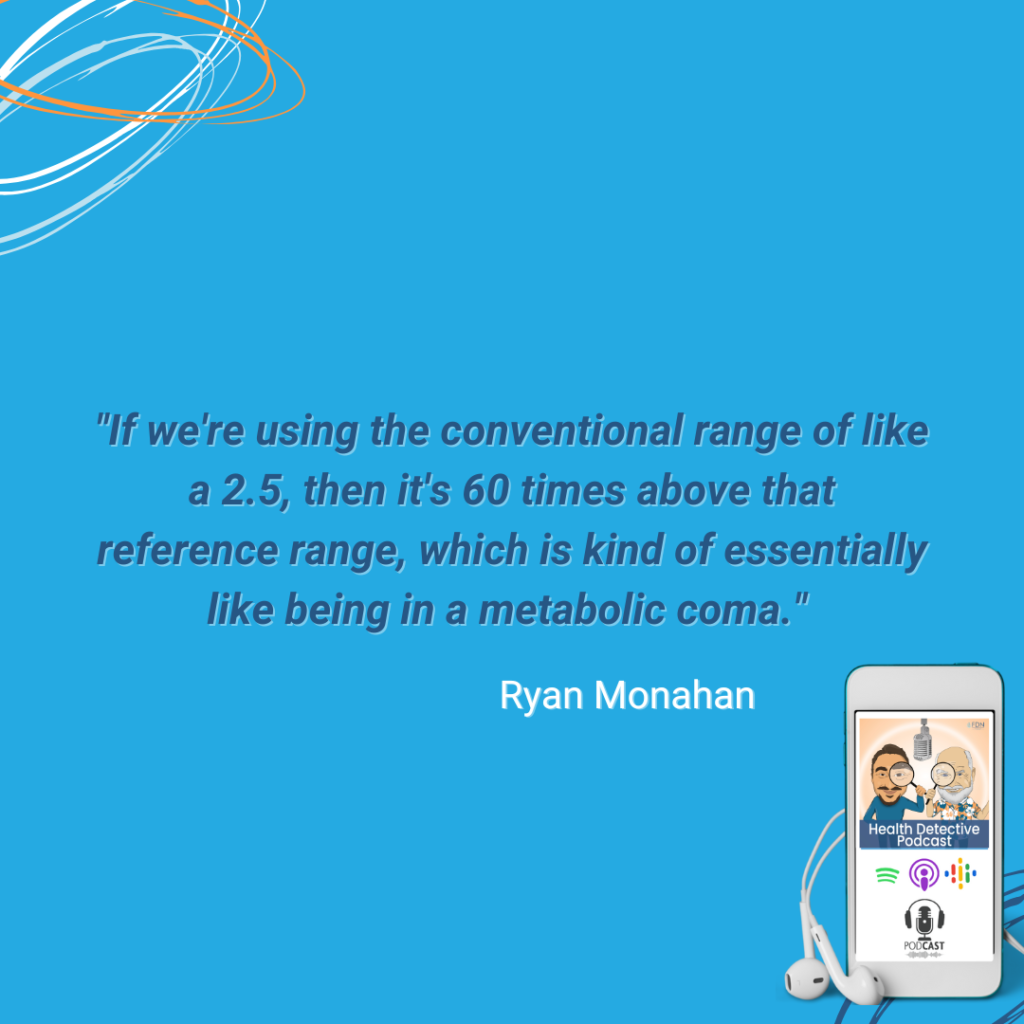
When I was first diagnosed with Hashimoto’s and hypothyroidism, my TSH was at 150. To do some quick math here, if we’re using even the conventional upper limit of a five for TSH, that’s 30 times above that reference range. If we’re using the conventional range of like a 2.5, then it’s 60 times above that reference range, which is kind of essentially like being in a metabolic coma.
The first thing the doctor said to me was, I do not even know how you’ve been able to get up in the morning. Not only that, I’ll add one more detail to this. On the lab report itself, I still have a copy. It didn’t just say that the TSH was 150, it said greater than 150.
The doctor explained that that’s where the lab actually tops off. That it was some number greater than 150, but the lab couldn’t get a reading higher than that. So that could have meant maybe it was 151, maybe it was 200. We don’t know. In either case, astronomically high.
In my practice working with clients with slow thyroid function in the past seven years or so, I still have not seen anything come close to that. Not that it’s a competition.
[00:12:11] Detective Ev: Not one you want to win, that’s for sure.
[00:12:14] Ryan Monahan: No,it’s not one you want to win. But just to illustrate just how out of whack my thyroid was. I was in a pretty bad state.
Lab Results Validation
[00:12:22] Detective Ev: I think it was good that we mentioned that because it is the craziest part for sure. It’s great that you found these answers eventually.
I’ve debated back and forth with certain people, not in our world, but they’ll be like, well, do you think these labs are useful? Don’t you think you’re scaring people sometimes if they see something. All I ever say to them is like, I am so thankful that you have never been so sick that that is your perspective on lab testing like this.
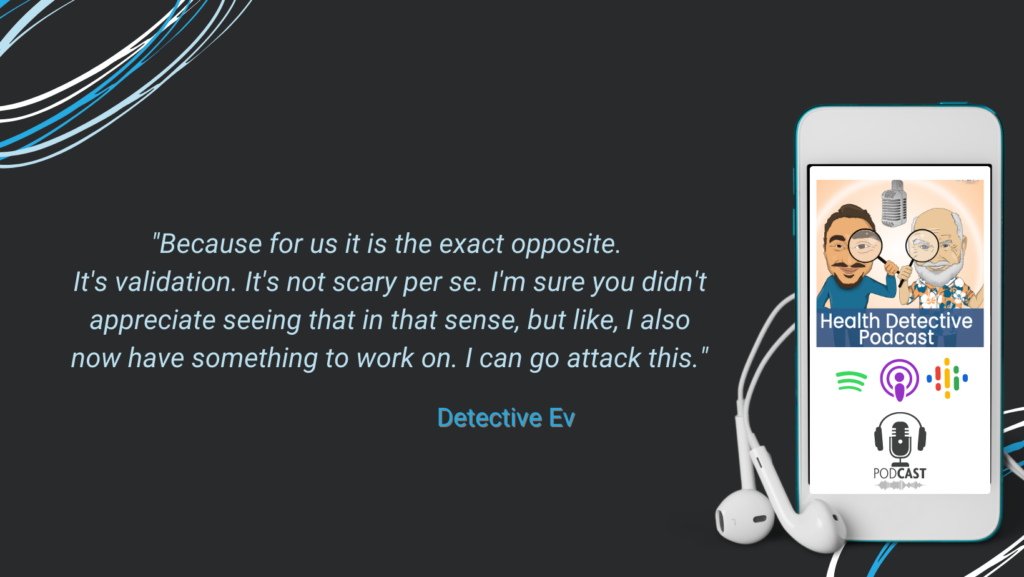
Because for us it is the exact opposite. It’s validation. It’s not scary per se. I’m sure you didn’t appreciate seeing that in that sense, but like, I also now have something to work on. I can go attack this. It’s not like you were a particularly natural focused guy at that time, so you were probably just happy to find anything that could help you with relief. I mean to the point that the next day the medication is doing this.
I’m in the same boat. I mean, I probably have not run nearly as many thyroid panels as you, but there was the one woman I actually brought her up to you before. She was at a 111 and that was four times higher than the highest I’ve ever seen in my personal practice where I’m using labs on people. It’s really high. It was ridiculous.
So I kind of credited her with the same thing. She’s a mom, you know, she’s doing all this stuff. I said, you know, I think it’s fair, if we say it at 150, it’s probably fair to say it at 111. I remembered your story immediately and I referenced it.
The Medication Lifeboat
I said, it’s impressive that you’re doing what the heck you’re doing every single day, playing mom, playing wife, when you got all this going on. Cause your body is not working with you right now, or the things you’re doing is leading to your body not working with you right now.
Between a combination of that medication, because she did use that. I like that you bring this up because I always try to show people on this podcast, we’re not being dogmatic one way or another. We believe that the functional, natural side is grossly underrepresented, but the medication is what got Ryan Monahan moving so that he could become the Ryan Monahan of today.
You know, that’d be pretty tough to have all the necessary motivation to just habit your way into a better thyroid number there. Like you needed some kick. And I’m sure getting that relief in a matter of (I mean, it wasn’t perfect, right?), but a major relief in 24 hours. Yeah. That’s gotta be pretty motivating for someone who had felt like you felt.
[00:14:19] Ryan Monahan: Really great point. I’m glad you brought that up.
I do have a good handful or percentage of clients that come to me and they’re kind of anti-medication or they want to get off their thyroid medication. And I understand where they’re coming from.

What I’ll explain to them is that when the thyroid is under functioning, sometimes we need to throw you a lifeboat when you’re drowning before you can get back on the shore. Then once we have the high ground, then we can do that deeper investigation to find out what the hidden stressors are in the body and support the physiology.
Focus on Getting Your Body Healthy
Then from that point, once your health starts to improve, then maybe you can look at potentially weaning off that thyroid medication. But I really don’t believe that’s the best approach to do in the beginning when you don’t have the lab data available. You don’t know what’s going on in your body, you’re still struggling with these symptoms. We need that lifeboat sometimes.
That’s where the FDN approach, we see ourselves as allied health professionals and we’re not anti-medicine. We want to use the best of both worlds. Like you said, I do feel that the holistic side is grossly underrepresented. But that’s why we’re here to teach our clients this set of skills, so that they can use these tools for a lifetime to maintain their health.
[00:15:36] Detective Ev: Absolutely.
People also need to realize if they’re coming to us as clients, while there are many doctor FDNs, the majority, like higher than 50%, are not doctors. You can’t come to us and say, I want you to get me off medication, that’s not what we’re doing.
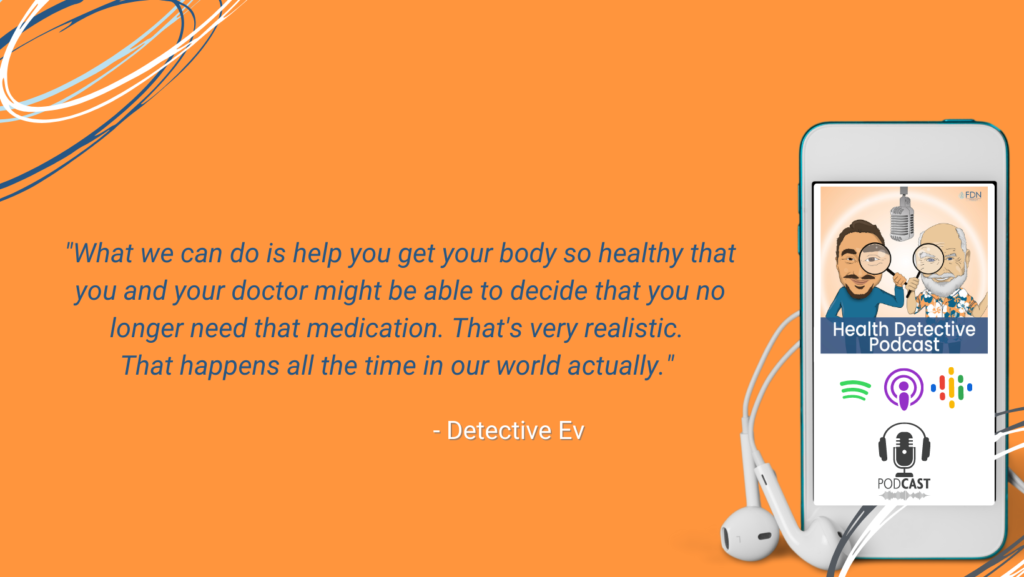
What we can do is help you get your body so healthy that you and your doctor might be able to decide that you no longer need that medication. That’s very realistic. That happens all the time in our world actually. But that can’t be the focus that you’re working on us with.
Let’s make the focus, getting the body healthy. If you have that goal in the back of your head, totally fine, that’s a personal goal. But we gotta make sure we’re doing that stuff properly. And I’ve had that experience with mental health clients, right? I’m like, I’m not telling them to get off medication, I’m not advocating for it at all.
Conventional Medical Perspective with Thyroid Markers
But sometimes the medications end up leading to symptoms because they no longer need it. You’ll know when you’re ready to get off the medication, it’s not going to kill you. Then you can go make that decision with your doctor.
With that all said, I want to actually go over these lab results with you. Now, thankfully these are pretty decent ones. But nonetheless, it’s still going to give us an opportunity today to really break down each marker. Sorry, I jumped a little bit ahead.
Before we do that, can we explain the difference really quick between what Western medicine, if they run the thyroid markers at all, what are they going to run versus what would we want when we say a quote/unquote “full thyroid panel”? Because that gets thrown around a lot, and I think there’s a lot of confusion as to what that means.
So what will Western medicine do typically, versus what we actually want?
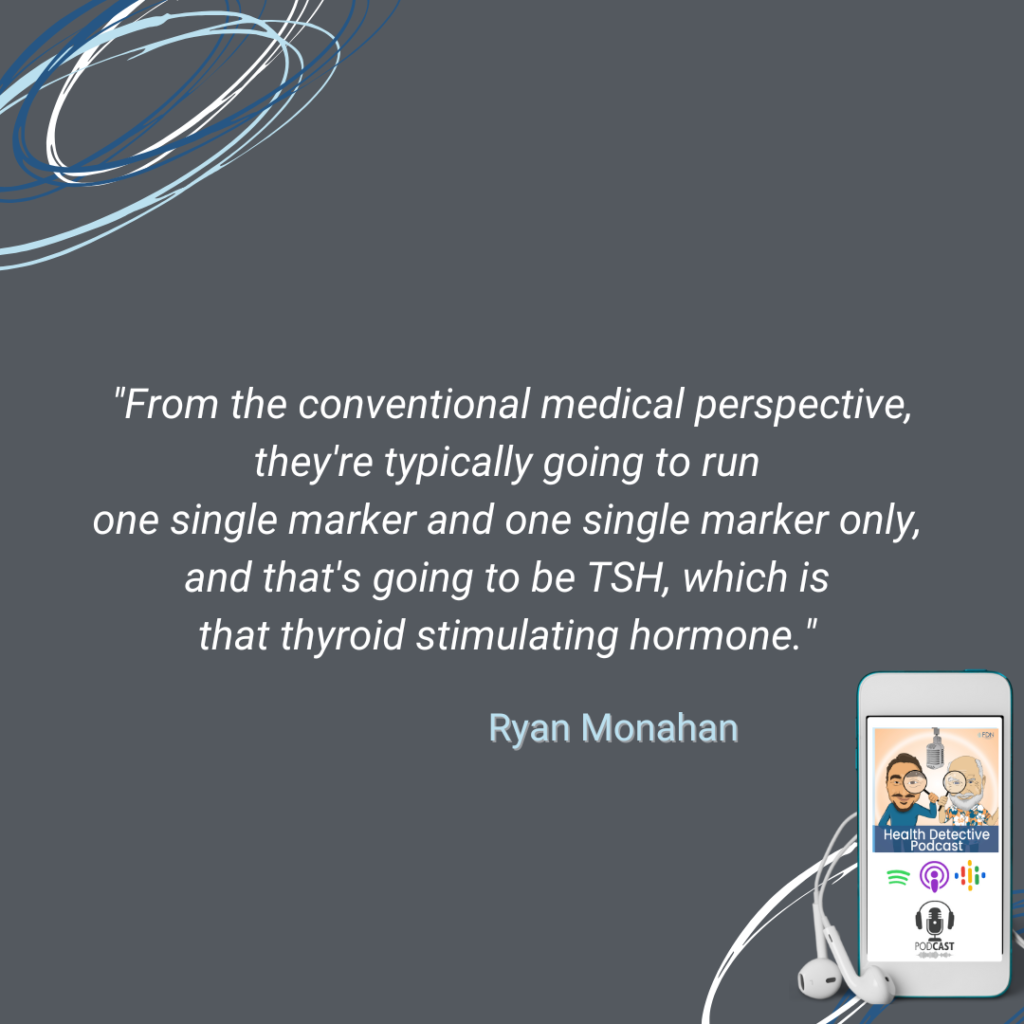
[00:16:58] Ryan Monahan: Yeah. From the conventional medical perspective, they’re typically going to run one single marker and one single marker only, and that’s going to be TSH, which is that thyroid stimulating hormone.
Now, here’s what’s interesting about that. TSH is not produced by your thyroid at all. It’s a hormone that’s produced by your pituitary gland. Essentially what that marker is telling you is the pituitary, which sits at the bottom of your brain, the base of your brain, that’s producing this hormone to stimulate, kind of like poking the thyroid to say, hey, wake up, make more thyroid hormone, right?
That’s why when the marker’s more elevated, that’s usually because the thyroid is slowing down and the pituitary is trying to stimulate it back into action.
Functional Medicine Perspective with Thyroid Markers
But technically, you’re really measuring this pituitary marker, which doesn’t give you any insight at all into what the thyroid is actually doing, and is therefore, in my strongly held opinion, a very, very limited perspective. Extremely limited, right? It’s like looking at a mountain range throughout like a peephole, you know, and trying to see the big picture.
If you’re lucky, sometimes they’ll see doctors also run maybe T4, like total T4 or Free T4. We’ll get into those when we look at the panel. Maybe if you’re really, really lucky, they’ll also run T3 as well. But I would say that’s still fairly limited.
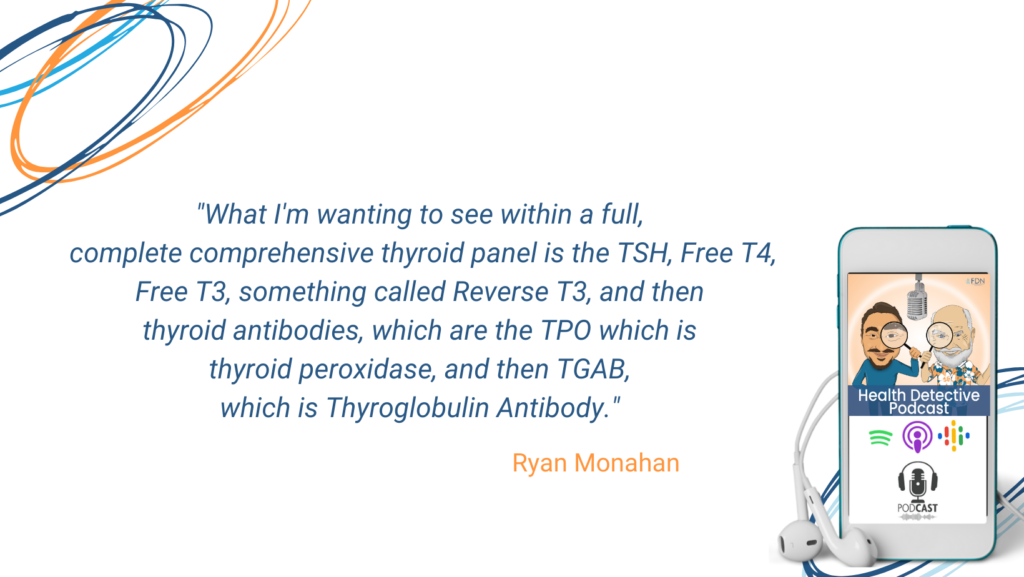
What I’m wanting to see within a full, complete comprehensive thyroid panel is the TSH, Free T4, Free T3, something called Reverse T3, and then thyroid antibodies, which are the TPO which is thyroid peroxidase, and then TGAB, which is Thyroglobulin Antibody.
Those two antibodies will tell you if the immune system is mounting an inflammatory response to the thyroid gland. That’s where you get into the autoimmune territory, which as it turns out, is more or less inseparable from hypothyroidism. That’s another thing I’m always trying to get the opportunity to teach or educate on, is that when someone says they have hypothyroidism, chances are their doctors have never run their thyroid antibodies.
But there’s about a 95% or more likelihood that they do have antibodies when there’s hypothyroidism. The two are inseparable. The hypothyroidism and the Hashimoto’s, 95% or more of the time they go hand in hand. So that’s just another point I thought I would throw out there. For those that think like the antibody component doesn’t matter, that’s false or incorrect.
Western Medicine’s Perspective on Antibodies
[00:19:38] Detective Ev: Yeah. The problem is, I think, is Western medicine (I mean, there’s an extreme end of this, and I don’t want to misrepresent what they do), but a lot of the times, if the antibodies are only elevated to a certain degree, you guys gotta understand, Western medicine doesn’t know what to do about that. They’re not thinking about the many triggers that could lead to a thyroid being attacked. They can only treat it once there is symptoms.
So, if you’re reacting, a very common one, this is elementary stuff in functional medicine, but gluten is a very common thing that is going to end up leading to the thyroid antibodies going up for people that are sensitive. There’s a process that can occur, which leads to that.

Well, Western medicine is not even thinking like this most of the time. They can only do so much with these markers anyway. It’s not that they don’t know they exist, it’s not that they’re being blatantly negligent. That’s not what the training includes. And even if it does include it, there’s only so much they can do.
My mom, you know, she got missed for years with this. And even trickier, because the Hashimoto’s stuff can be hard enough to find, the hypothyroidism stuff can actually be hard to find. But she was dealing with Grave’s disease, which is the much less common thyroid autoimmune disorder.
It’s pretty much, in a sense, the exact opposite for those listening. Whereas, you had said, like there’s this counterintuitive thing where the TSH is high, and it actually means things are going slow. My mom’s TSH was extraordinarily low, like well below the reference range in functional and Western medicine, and it’s everything speeding up.
Looking at Detective Ev’s Thyroid Markers
Whereas the Hashi’s patients, they’ll be eating 1200 calories a day, as fully grown women and they’re gaining weight, gaining weight, gaining weight. My mom, because we didn’t know anything at this time, 10 years ago, she’s coming home and eating (this isn’t a joke, right?), she’d eat a full thing of Chips Ahoy.
She had these intense cravings and could just burn through food. She’s getting like three, four hours of sleep a night. Her heart rate was sitting at around like 120, 130 beats per minute, resting, just resting on the couch. It is an entirely different type of uncomfortable because many of the Hashimoto’s patients are very uncomfortable.
So yeah. Without further ado, let’s get to some of these lab results here. I’m going to pull mine up. Just for some context, this is from May of 2020. I was running a very large blood panel. I mean, there’s a whole, we could spend three hours on this panel together. I just ran general blood work.
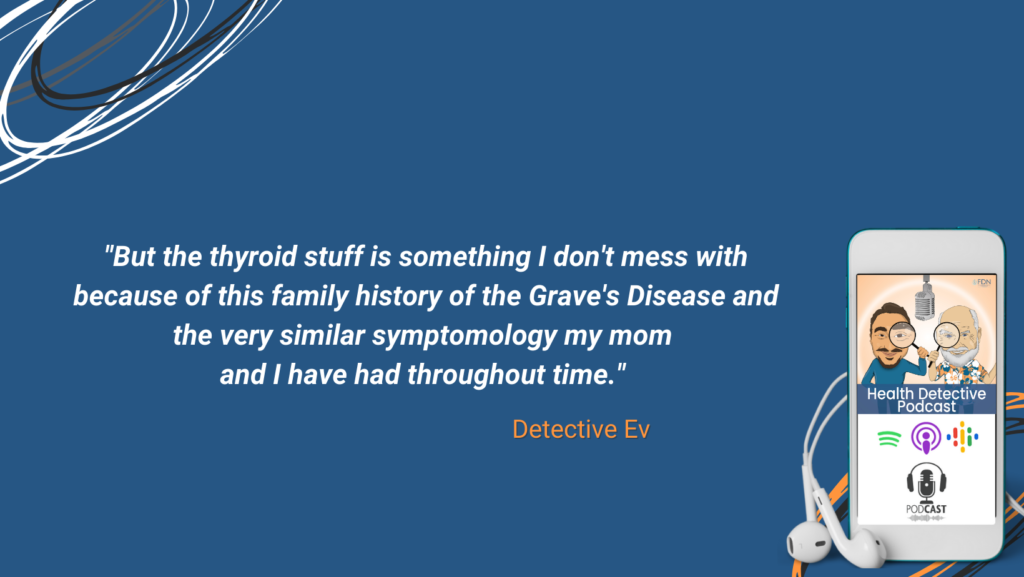
I wanted to see where I was at with certain things. Many things, you know, I expected. Other things, I didn’t expect. But the thyroid stuff is something I don’t mess with because of this family history of the Grave’s Disease and the very similar symptomology my mom and I have had throughout time.
So, what do you think of my thyroid panel, Ryan? Do we approve of this? Is this full enough for you?
[00:22:02] Ryan Monahan: Great question. So, the first thing I’ll start with is the TSH.
Thyroid Markers: The Thyroid Is Interconnected
Actually, let me take a step back here just for those that are going to be listening to this. I like to say that when the thyroid becomes dysregulated or dysfunctional, that this doesn’t happen in a vacuum. Another way that we can say this is that the thyroid dysfunction is not the problem. It’s a result of the problem.

When we’re looking at a thyroid panel, we want to remember that the thyroid doesn’t function in a vacuum. It doesn’t function separate from all the other functions in the body, from what your liver is doing, your gut, your lymphatic system, your brain health, it’s all interconnected, right?
As FDNs, we’re speaking the language, same language, you and I, Evan. We know that everything is interconnected and I just kind of wanted to make that general point first.
Okay, that TSH there, it’s a 3.19, is that correct? The font size is a little small on my screen. I don’t know if you can zoom in a touch.
[00:22:59] Detective Ev: How about that? Does that help?
[00:23:01] Ryan Monahan: That’s fine. Yeah. 3.19. Technically, that would be a touch high. That’s something I would want to investigate a little further. Now notice there, given the provided lab range is 0.45, so about 0.5 to 4.5. That’s that conventional medical range there. So, you’re going to see the TSH looks “normal,” quote/unquote.
How many times is a doctor going to look at your lab test and say, everything looks fine, everything looks normal, right? Classic line. When we’re looking at functional ranges or optimal ranges, they’re going to be a little tighter because we want to be more proactive with our health and identify biomarkers before they start trending out of range.
Thyroid Markers: Symptoms of High TSH
From that tighter functional perspective, I don’t really like seeing that above a 2 or a 2.5. 3.19 is technically a touch high. Nothing that would scare me or cause me to create a sense of alarm for the client, but it is something I’d want to investigate a little further. If I saw that TSH trending a little high like that, I would want to look at the other thyroid hormones and see if those might be low.
Because remember, the higher the TSH goes, typically what we’ll see is that the actual thyroid hormones themselves are a little on the lower side. For example, the T4 direct there, which we see at the bottom of the page, it says 1.34. I generally like to see that between 1.4 and 1.8. So, this is making perfect sense. The TSH is a little high by just a touch. The T4, the Free T4 is also just a touch, a little bit low.
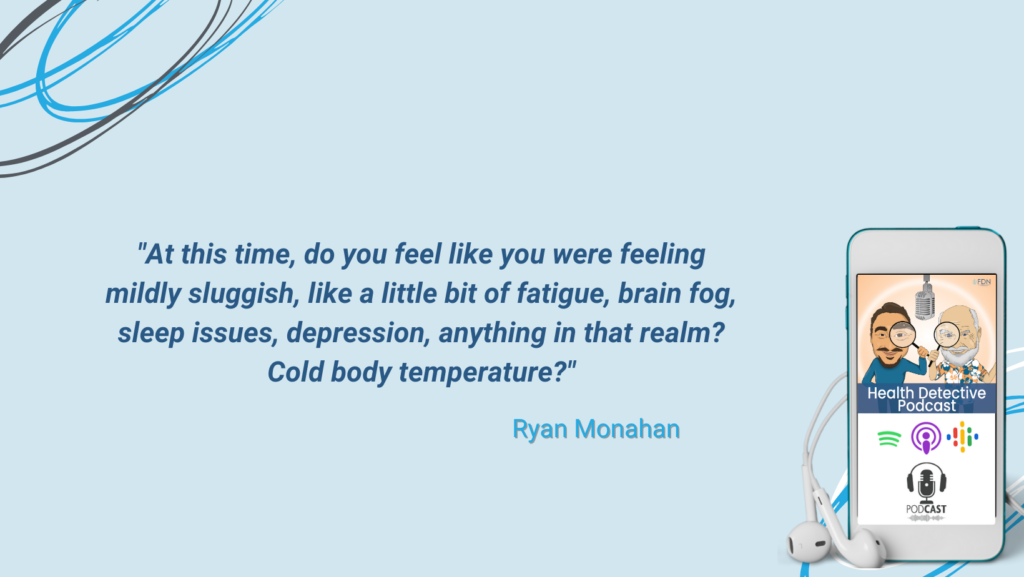
So let me ask you a question, Evan. At this time, do you feel like you were feeling mildly sluggish, like a little bit of fatigue, brain fog, sleep issues, depression, anything in that realm? Cold body temperature?
[00:24:54] Detective Ev: Not the depression, actually. A little bit of fatigue. Really this had come after the pandemic. In the beginning at least, was almost a blessing in disguise for me. You and I are very similar in this sense, like we’ve had our health taken from us, but we’re also super passionate people.
Thyroid Markers: Correlating with Symptoms
This is when I was working on my book, I was speaking full time. I was still working other jobs. I was not in my space full time yet. I was doing other things I didn’t want to do 40 hours a week, and then going and doing the other stuff. So, I was just coming off of that. That had just ended in March of that year, thankfully permanently.
I knew I wanted to check in with my body and see how are we doing here? Thankfully, for whatever it’s worth, I should have prefaced this, I do know that the TSH is within range now. I ended up running this later, and it was finally, this was the first time in my life it was in that 2 to 2.5 range, it was a 2.4.
Because as a kid it was a 4.5 and they said nothing about this at 17. My parents and myself didn’t have the training. We said, oh, it’s within range. I’ve seen this trend historically, where when I was really sick it was higher and then it had went down over time. So, I didn’t feel particularly bad.

Well, I guess I didn’t feel bad in a mystery sense. I knew what was going on cause I had just beaten the heck out of my body for the last year or so.
[00:26:04] Ryan Monahan: Got it. And you know, a lot of what I’m saying now too, is somewhat nitpicky because we’re already looking at pretty tight ranges. It’s not that I would expect anything dramatic here, if anything would be pretty subtle.
Thyroid Markers: Free T3
You asked too, what your grade would be, maybe call this like a B+ so far.
So, let’s look at the Free T3, which is just below that’s cut off on my screen.
Detective Ev: 3.1.
Ryan Monahan: 3.1, okay. So again, not bad. If I’m being nitpicky, the optimal functional range for Free T3 might be about 3.4 to 4.4. That would technically be from a functional perspective. If we’re looking at wanting to achieve optimal health, just a touch low.
Now Free T3, I’ll just make a couple points here about these thyroid hormones, just to throw in some kind of interesting context.
Detective Ev: This is perfect. Cool.
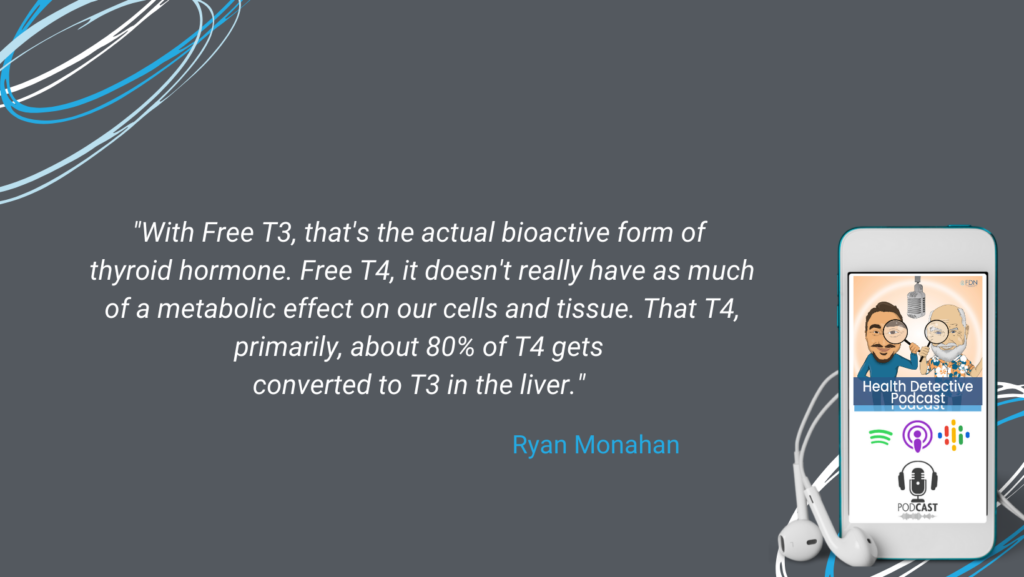
Ryan Monahan: With Free T3, that’s the actual bioactive form of thyroid hormone. Free T4, it doesn’t really have as much of a metabolic effect on our cells and tissue. That T4, primarily, about 80% of T4 gets converted to T3 in the liver. That means we also need the liver to be functioning well in order for that conversion to happen properly from T4 to T3. 80% of that conversion, that’s a lot. The conversion doesn’t happen in the thyroid. That’s why again, this holistic picture is so important.
I like to say that free T3 is like the accelerator pedal for the body. It is that important. We have receptors for T3 in every single cell of our body. I believe the only other hormone that could be said for is vitamin D. Those are the only two hormones in the body, and vitamin D is a hormone.
It should be called hormone D, not vitamin D. Those are the only two hormones in the body that we have universal receptors for. That ought to tell you something about the importance of T3 to our body.
Thyroid Markers: Reverse T3
If T3 is the accelerator pedal, then let’s now talk about what the brake pedal would be. The brake pedal is going to be a little bit above at the top there, it’s going to be the Reverse T3, it’s called.
[00:28:32] Detective Ev: I think there’s a little bit of a delay that comes on yours. There we go.

[00:28:34] Ryan Monahan: So Reverse T3, what it actually does is it blocks the Free T3 from getting into the cells. With this Reverse T3, we actually don’t want it to be too high. The optimal range for Reverse T3 is really anywhere below 15. We want to see that ideally below 15. Again, so nitpicky here, I know. But these results are pretty decent to begin with. We are technically a little bit above that 15 at a 17.3.
Here’s what happens. If the Free T3 is a little bit on the lower end, it’s kind of like we’re letting off the gas in the body. Things are going to slow down. At the same time, if the Reverse T3 is high, we’re simultaneously putting down the break. If we’re letting off the gas and pushing down the break at the same time, what’s going to happen? Things are going to slow down even further. There’s kind of a double whammy effect there when the Reverse T3 is high and the Free T3 is a little lower.
Now, in terms of the “why”, why does Reverse T3 become elevated? Can be a number of factors. Stress is one of the biggest factors, and you mentioned that actually. That actually means our body has this really intelligent, innate mechanism to kind of force us to slow down.
Thyroid Markers: Factors Behind Elevated Reverse T3
When we’re trying to push too hard and put too much stress on the body, your metabolism goes, whoa, slow down. Let’s put on the brakes. It’ll do that for you if you’re not doing it for yourself, which is kind of cool, right?
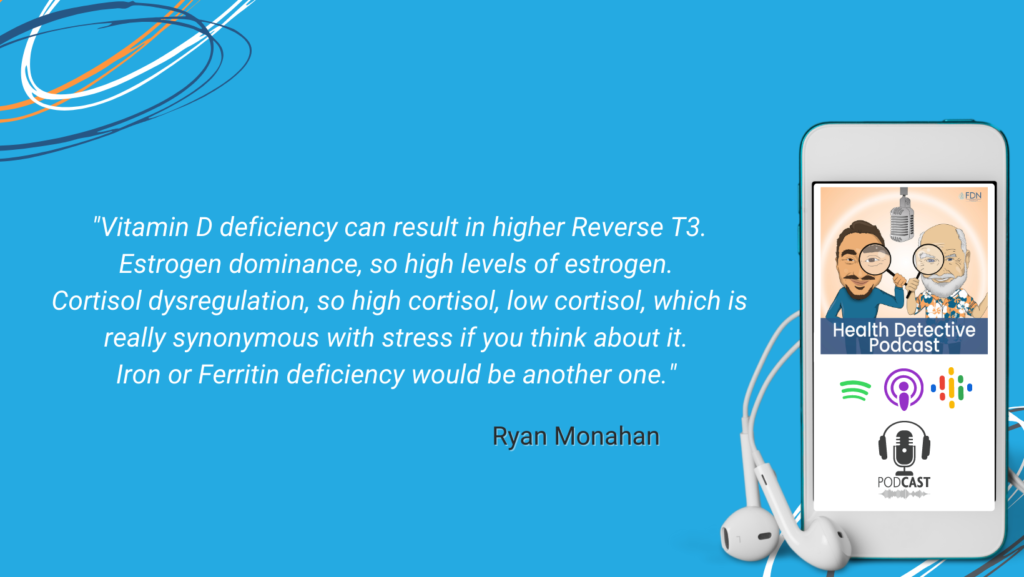
Vitamin D deficiency can result in higher Reverse T3. Estrogen dominance, so high levels of estrogen. Cortisol dysregulation, so high cortisol, low cortisol, which is really synonymous with stress if you think about it. Iron or Ferritin deficiency would be another one. So those are the four or five factors that would cause elevated Reverse T3 which again is going to slow down the body.
Kind of fun to get into some of these dynamics and talk about how things are interconnected. If you’re interested, I’ll give your listeners another one.
[00:30:38] Detective Ev: This is exactly what I wanted to do today. We don’t always get as nerdy on here, we kind of get into the stories and there’s value to that, but I know that they also love this. This is amazing. So please, yeah, whatever else you got.
[00:30:49] Ryan Monahan: Well, very cool. Let’s go back down to the Free T4 and T3 please, if you don’t mind. I’m going to tell you guys today, something that even I have found probably 95% or more of functional practitioners don’t know. That is, what are the building blocks for thyroid hormone? This is important because it means we need to get enough of these building blocks somewhere, and we’re going to ideally get most of those from the diet.
So, let’s take T4. Going to break this down really simple. What does the “T” actually stand for in T4?
[00:31:28] Detective Ev: You taught me this before too.
Thyroid Markers and Tyrosine
[00:31:30] Ryan Monahan: It’s okay if you don’t know.
[00:31:32] Detective Ev: I forget. You have told me, I remember you telling me, but I forget.

[00:31:35] Ryan Monahan: So, the “T” stands for tyrosine. Tyrosine is an amino acid that we primarily get from protein in the diet., meat, fish, chicken, eggs, pork, bone broth, collagen. Right? Those are all going to be sources of tyrosine. Let’s suppose we’re not getting enough of those foods in the diet, or maybe we are, but we’ve got poor absorption because of what’s going on in the gut.
If there’s gut dysfunction, maybe we’re not breaking down protein into amino acids very well because there’s issues with malabsorption or low stomach acid. That’s how digestion could be related to lower tyrosine intake, which can compromise our thyroid hormone production.
So, we need tyrosine, we need it to make thyroid hormone. Now, maybe this is a discussion for another time, but at the time of my thyroid diagnosis at that point in my life, I was actually a vegan. I was eating a plant-based diet. I was definitely not getting enough tyrosine in my diet, which was probably compounding things. It’s going to be much more difficult to get enough tyrosine from a plant-based diet.
So, the number 4, what that actually stands for is the number of iodine molecules that it takes to make that thyroid hormone. With T4, we’re looking at tyrosine plus 4 iodine molecules.
Iodine deficiency, I believe is rampant. Most iodine in the diet we get from seafood, shellfish, and seaweed, like kelp for example. Those are not foods that are in most people’s diet within the standard American diet. But you actually need iodine to make thyroid hormone.
Good Optimal Thyroid Function & Nutrient Density
The only difference with T3, it’s the same formula. The “T” is tyrosine, but instead of 4 iodine, we have 3 iodine. That’s what those numbers actually stand for. Four iodine molecules and then three iodine molecules respectively.
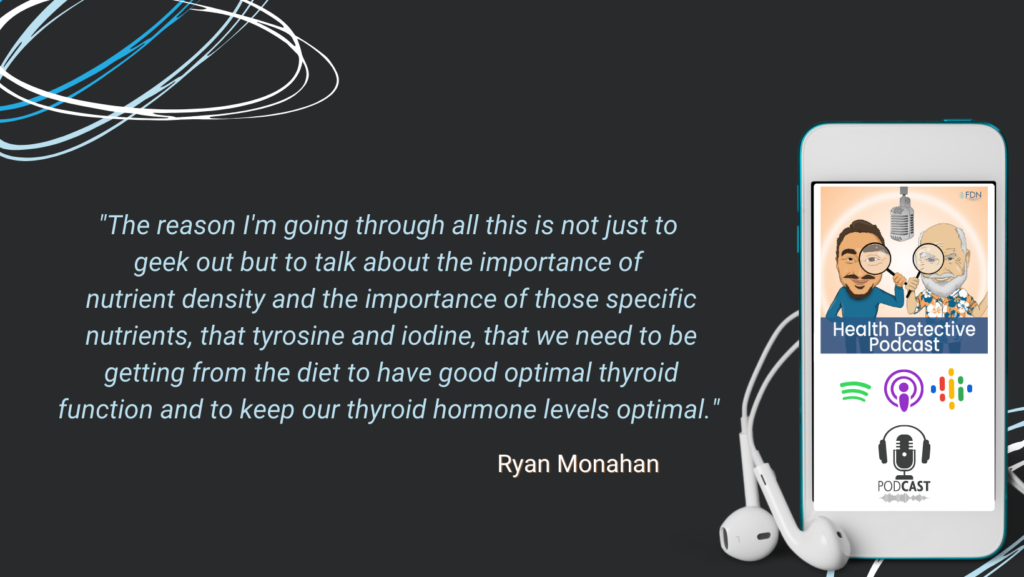
The reason I’m going through all this is not just to geek out but to talk about the importance of nutrient density and the importance of those specific nutrients, that tyrosine and iodine, that we need to be getting from the diet to have good optimal thyroid function and to keep our thyroid hormone levels optimal.
[00:33:56] Detective Ev: One thing I’ll throw in here because it was kind of weird. I didn’t have confidence in the answer. What you had said, like, I did not remember that it was tyrosine. But somewhere Ryan Monahan’s words must have rang true because when you said, what are the building blocks here? I’m like, oh, amino acids. I know it’s gotta be amino acids.
But I didn’t make that connection immediately between the tyrosine and stuff like that. And yes, you were absolutely correct that I would say many functional practitioners, if not that 90, 95% that you talk about, do not know that. I have never heard that discussed one time anywhere else except by you. It’s pretty interesting to know.
It’s also fascinating as someone who has this family history of thyroid issues that I’ve also had an issue with the dopamine side of things. I don’t know if it’d be diagnosed ADHD, but there’s definitely an aspect there prone to substance abuse, prone to just obsessive natures with things that I’m super interested in. Then this like mixed ability, especially in school where I know everyone obviously does better if they’re interested in the topic. That just makes sense.
Get More Meat Protein for Tyrosine Deficiency
But I’ve always described it to people that it was so extreme on either end. It went from, if I’m interested, like truly interested, it’s nearly perfect retention, to, if I’m not interested, I just can’t even do the bare minimum to get by in that area of schooling or learning or whatever.
It’s kind of fascinating because, FDN, I flew through it, no problem. Then you give me something that is five times less hard than FDN and I will struggle with it so greatly cause I just cannot get the focus. I mean, this’s a little better now. But I just couldn’t get the focus there to be able to do something like that.
I find it interesting that we’re talking about tyrosine, which I would assume many listeners know this if they’ve made it this far and are nerding out this way. But just in case, tyrosine can be the thing that helps produce the dopamine, right? There’s phenylalanine involved as well. But, you know, this is something that would be related.
I’m kind of making that connection there in my head, already thinking about what I was like in high school with this high TSH. I’m assuming these other numbers would’ve looked terrible had someone actually ran them. And my inability to focus and the lack of happiness and the need for substances to get through the day at that time of my life.
[00:35:53] Ryan Monahan: Yep. Makes perfect sense. Those symptoms you’re describing, like the low attention, distractability. Those are classic low dopamine symptoms.

And if I have a client in that predicament, one of the first things I’ll suggest to them is just getting more protein in the diet, so they’re getting more tyrosine.
Thyroid Markers: Thyroid-Binding Globulin
Also, improving their digestion and absorption so that they’re breaking down the tyrosine from the protein and their diet. Then if those basics aren’t working, we might work in some amino acid precursors, like the tyrosine. There’s some formulas out there. There’s one I like called DopaPlus from Pure Encapsulations that has not only the tyrosine, but the other co-factors like vitamin B6 and folate that you need to convert the tyrosine into dopamine.
[00:36:38] Detective Ev: Cool stuff. What else do we need?
Here, I’ll ask questions that I could imagine would come up with the audience. All right. So, we have the T3 uptake and then we have the Free T3. And again, maybe they haven’t even heard of some of these markers. Then, of course, there’s just the general T3.
I know that’s probably a loaded question, but like, what the heck is the difference between all of those things? I don’t think we’ve touched on the T3 Uptake yet at all.
[00:36:58] Ryan Monahan: Yeah. So, when we’re looking at Free T3 and Free T4, what the word Free means is that it’s not bound to a carrier protein.
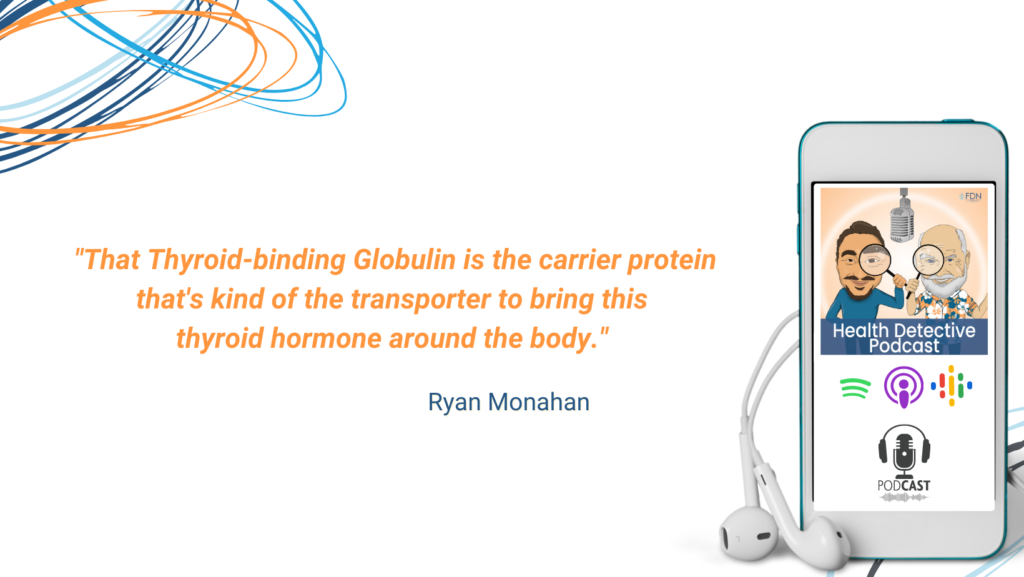
One thing that is not on this thyroid panel that you usually won’t run or see very much is something called Thyroid-binding Globulin. It is something you technically can include in a thyroid panel. That Thyroid-binding Globulin is the carrier protein that’s kind of the transporter to bring this thyroid hormone around the body.
Thyroid Markers: “Free” Means It’s Bioavailable
On a little side note, if your Thyroid-binding Globulin is too high, that can be one of the reasons why your Free T4 and Free T3 are low. Because too much of the Free thyroid hormone is bound to the carrier protein. It’s like the thyroid hormone is still in the car and it’s not getting out of the car, just to use like a loose analogy.

So that Free, that word “Free” means it’s bio available. It means your cells can actually take in that thyroid hormone.
When we look at Thyroxine there, that’s looking at the total amount of the T4 in the body, but not the Free fraction or the bioavailable fraction of it. And same thing with that Triiodothyronine, it’s a kind of a mouthful, that T3 there, which is at a 98. That’s the total T3 in the body. So those can give you a quick check to make sure, like, is the body making enough of those total amounts of thyroid hormone. The Free fractions of those are telling us that there’s actually enough for the cells to use and take in.
Then the T3 Uptake, as the name implies, it’s how much of that Total T3 are the cells uptaking or taking in. That’s expressed in a percentage form there because it’s the percentage of that Total T3.
Then, we didn’t quite get into the thyroid antibodies. We have the Thyroglobulin and the Thyroid Peroxidase. We can see those are below one and below nine respectively. Those are the two thyroid antibodies that I mentioned earlier. Those look great. But supposing that either of those were above 10, that’s when I might start to consider that there’s an autoimmune process going on here.
The Body Doesn’t Make Mistakes
What that actually means is that the thyroid is creating these antibodies, which is signaling the immune system to produce neutrophils or other first responder type cells, to come in and actually cause destruction or attack the thyroid gland. In a sense, some people would say that when there’s antibody presence to the thyroid, it’s almost like a type of betrayal, like the immune system is turning on you and it’s attacking your body’s own tissue.
The one important caveat I would add to that though, I really don’t like that kind of language with autoimmunity, there’s some kind of betrayal or that the body is somehow stupid and doesn’t realize it’s attacking itself. I don’t believe there are any mistakes. I really think the body’s always doing its best to protect you. The outcome may not be desirable. I’ll go on a little tangent to explain this.
I was working with a client about a year ago who’s a family therapist. She said something that stuck out to me as a reflection on her career in family therapy. She said, there is no dysfunction, there are no dysfunctional families, there’s only function. I kind of got what she was saying, but I asked her to elaborate and explain.
What she meant was that everyone is doing the best that they can with the tools that they have available. It may not be the most desirable outcome or situation that you’re wanting within that family structure, but it’s not dysfunctional. You’re functioning, it might just not be functioning the way you want it to.
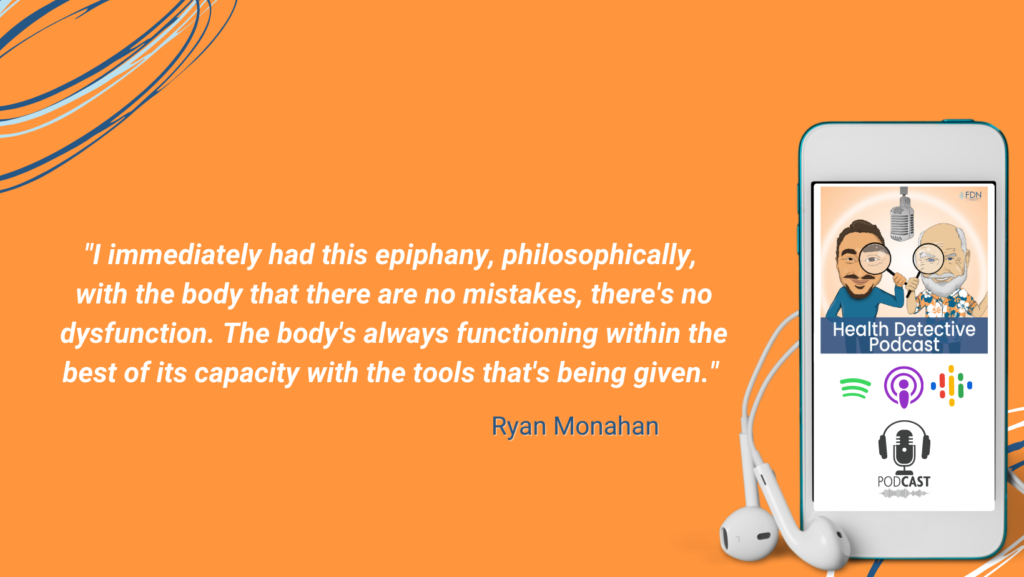
I immediately had this epiphany, philosophically, with the body that there are no mistakes, there’s no dysfunction. The body’s always functioning within the best of its capacity with the tools that’s being given.
“Friendly Fire” from the Body
Where we see these kinds of errors of the immune system, so to speak, is usually when there’s a lot of stress in the body. Whether mental and emotional stress, infections in the gut, toxins, which even toxins can actually get into the thyroid. The thyroid is almost like a sponge for toxins. It has a high affinity for absorbing things like heavy metals.
Just to give an example, what the immune system might be doing when it’s trying to cleanse or detox your thyroid from heavy metals or other toxins, in the process that’s causing damage and destruction. But it’s actually trying to protect you.
Or as another example, if you’re eating gluten in the diet and that gluten represents an antigen or a food sensitivity, gluten can be a major trigger for intestinal permeability. The gluten can leak through your gut into the bloodstream. Then that creates a situation where your immune system’s trying to resolve that gluten antigen by breaking it down or removing it from the body.
It might start firing off granules or little chemical bullets at the gluten. But then maybe there’s a protein in the thyroid that looks really similar to the gluten protein. So, it starts also attacking the thyroid gland because it loses the ability to make the distinction between the gluten and the thyroid. That process is called molecular mimicry.

It’s kind of like in the military they use the term “friendly fire” which is not very friendly at all. It’s kind of a euphemism. In that case, again, that’s your body trying to protect you against some kind of foodborne antigen or toxin in the body. In the process, unfortunately, your thyroid gets caught in the crossfire and you can end up with physiological damage to your thyroid.
The Fundamental Difference Between Western & Functional Medicine
I know I went on a bit of a tangent there, but I wanted to make that distinction cause I do see a lot of practitioners out there saying autoimmunity is your immune system attacking your thyroid. There’s a little more to it than that. And I do think it’s your body doing its best to try to protect you.
[00:43:04] Detective Ev: It’s interesting that you brought that up because it was a subtle thing, but you would probably know why I said it that way. I corrected myself in the beginning because I said something along the lines of that woman with the 111 TSH, I said her body was really messing her up.
Then I stopped myself and I said, well, the things that she’s doing is really getting the body out of whack. Because the TSH, it wasn’t the body’s problem. She was eating certain things and doing certain things that were leading to this.
Even in a case like cancer, cause I can imagine if I’m an audience member, maybe one of the first rebuttals I would have to something like what you just said is, well what about cancer tumors? That’s the body doing something wrong. It’s like, well actually it couldn’t be doing something more right. It is trying to concentrate all that bad and then you get a tumor. That’s why they cut it out because they’re trying to concentrate all that bad there. Like sequestering kind of.
[00:43:46] Ryan Monahan: Sure.
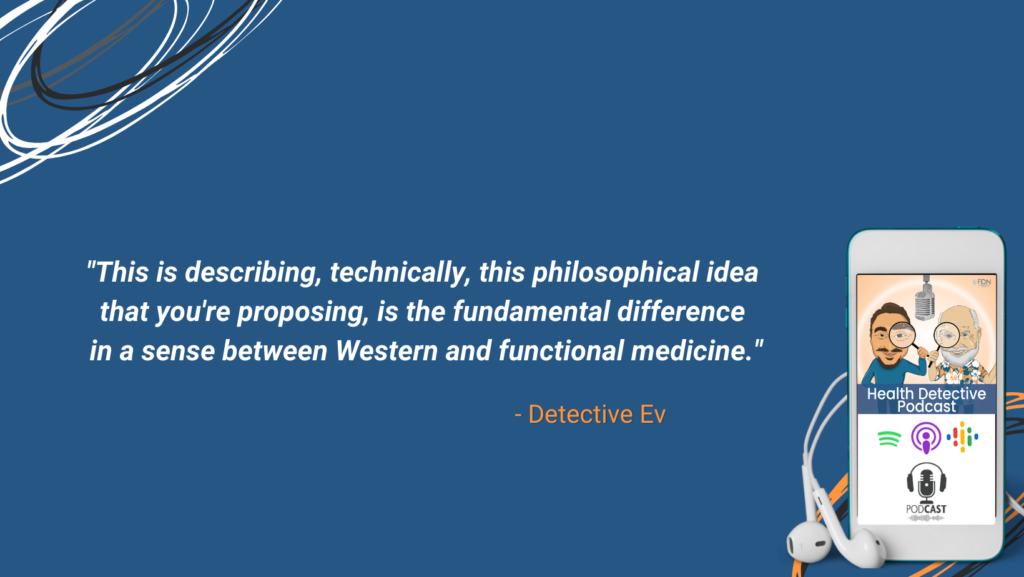
[00:43:48] Detective Ev: This is describing, technically, this philosophical idea that you’re proposing, is the fundamental difference in a sense between Western and functional medicine.
Doing the Right Things but Using the Wrong Fuel
The minute that you believe the body is doing something inherently wrong, you treat it with medication. When you believe that the body is doing everything right, but it’s getting the wrong fuel, it instantly changes to a personal aspect where, well, what am I putting in? What’s going on? And it’s not so black and white.
We talked about the aspect of like the life jacket type of thing with needing the thyroid medication. That’s fine. There is a certain time where we get in our health where yes, we might just need the Western medicine and that’s totally fine and appropriate. But generally speaking, you have to understand this philosophical difference. Otherwise, there’s no reason to take the natural route.
Your body though is meant to survive. And if you buy into the idea, which I personally do, that we are the best of the best genetically that have made it to this point. I mean, there’s a lot of things that have to happen in history for you to be alive right now listening to this podcast.
In theory, you should be the strongest of the strong, genetically. So don’t tell me that the strongest of the strong somehow leads to 50% of Americans, or 48% of whatever it is, having diagnosed chronic diseases, one in four dying of cancer, one in four having mental health issues. I’m not buying that is what the strongest of the strong genetically just happened to look like.

I think this is a result, and clearly you believe this as well, of the things that we’re doing in our modern world. The body’s doing the right thing. It’s trying to protect you. But when we do the right things and put in the wrong fuel, it’s never going to work.
Normalizing Insane, Unhealthy Practices
[00:45:21] Ryan Monahan: Such an extremely important point. Because when we’re looking at that “dysfunction”, quote unquote in the body, we have to look at the entire epigenetic environment. You know, what is that person putting into their body? Are they putting in fuel that is biocompatible with their cellular machinery? Or are they putting sand into the gas tank and then wondering why my body is not working?
Are they exercising? Are they managing stress? Are they optimizing their sleep hygiene? Right? All these different factors where we are this finely tuned biological machine that has to kind of follow in a sense, these laws, these biological laws.
And if we try to break them, a really simple analogy, I sometimes use this with my clients. Like, we know in order for a plant to survive, it needs some pretty basic things like sunlight and water and healthy nutrient dense soil. I’ve got a snake plant behind me. And if you saw me pouring like a liter of coke in there to water the snake plant, you would think I’m insane or that something is wrong with me mentally. Because, you know, just automatically, intuitively, that, that’s going to kill the plant, that the plant is going to fail to thrive or maybe even die.
[00:46:35] Detective Ev: Yet amazingly, you could do that same thing with a human, and no one bats an eye.
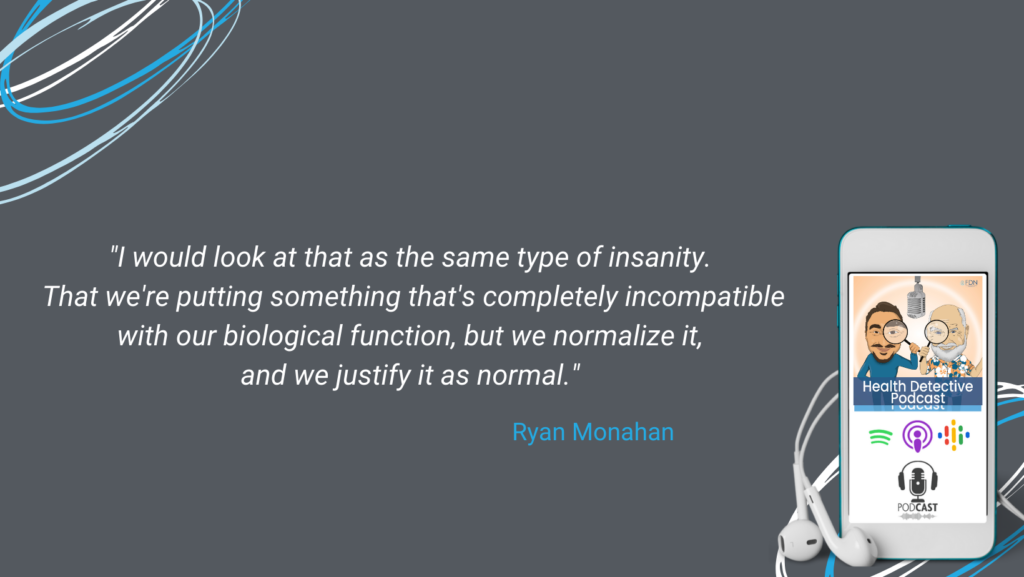
[00:46:39] Ryan Monahan: No one bats an eye, right? I would look at that as the same type of insanity. That we’re putting something that’s completely incompatible with our biological function, but we normalize it, and we justify it as normal.
A Science Experiment with Processed Foods
Then we wonder why we have a nation of people struggling with diabetes and obesity and insulin resistance, metabolic syndrome, and all these things are on the rise.
For hundreds of thousands of years Coca-Cola, or sugar water, wouldn’t even have been something that would be available for humans if we wanted it. Obviously, it’s kind of a new phenomenon. So, we’re amidst this kind of science experiment that we’re conducting on the human race with processed foods.

Then you add onto that, like a sedentary lifestyle, increased amounts of work-related stress, toxins in the environment. You get into this kind of perspective on disease that it’s actually the environment or the epigenetic environment we find ourselves living in, that’s just not compatible with our optimal function from that evolutionary perspective.
[00:47:42] Detective Ev: Me and you could go forever. I know we’re running a little short on time and I want to be respectful to it. So, thank you so much for coming on.
One thing I wanted to do really quick, and we could just kind of fly through it, is I picked these labs. I mean, I know they’re mine, but I actually picked them very specifically because I knew that they were walking on the edge of the functional side.
For those that are on the audio only, I will put it this way. Every single thyroid marker that we talked about today on my labs, to be clear in the Western sense, is all within range. And you’re a brilliant guy, so maybe it’s not that hard for you to do offhand, but I don’t know if you were just talking functional ranges for certain things versus Ryan Monohan ranges.
Thyroid Markers: Are They In-Range Optimally?
Let’s talk about generally accepted functional ranges we’re just going to go over for the audience. I’m going to go marker by marker. I’ll read them out loud and you tell me if this actually would’ve passed a functional range.
Detective Ev: So, Reverse T3.
Ryan Monahan: No.
Detective Ev: Okay. Thyroglobulin. Well, sorry, the antibodies. They’re all good.
[00:48:35] Ryan Monahan: The antibodies. Yes. That’s where you get a passing score.
[00:48:37] Detective Ev: Yeah, and I really cared about that, obviously, with this history of the Grave’s Disease in the family. I was happy about that.
TSH we already discussed would not pass a functional range, Correct?
Ryan Monahan: Correct.
Detective Ev: T4.
[00:48:48] Ryan Monahan: T4, I would say it’s, no. I’d want to see that a touch higher. Let me think here. I’d want to see that at least at an 8. At least at an 8 or a little higher.
Detective Ev: Okay. T3 Uptake.
Ryan Monahan: Yeah, would want to see that above like 30, 35, more towards the top end of that reference range.
[00:49:09] Detective Ev: The Free Thyroxin Index.
[00:49:13] Ryan Monahan: That Free Thyroxin Index, again, I’d want to see that above, like a 2.5 or a 3. So no, wouldn’t pass that optimal score.
Detective Ev: Okay, T3.
Ryan Monahan: Yeah. Again, you know, at least above 120, 140. So not quite.
[00:49:31] Detective Ev: And then the Free T4 and Free T3.
[00:49:35] Ryan Monahan: Nope.
[00:49:37] Detective Ev: Okay.
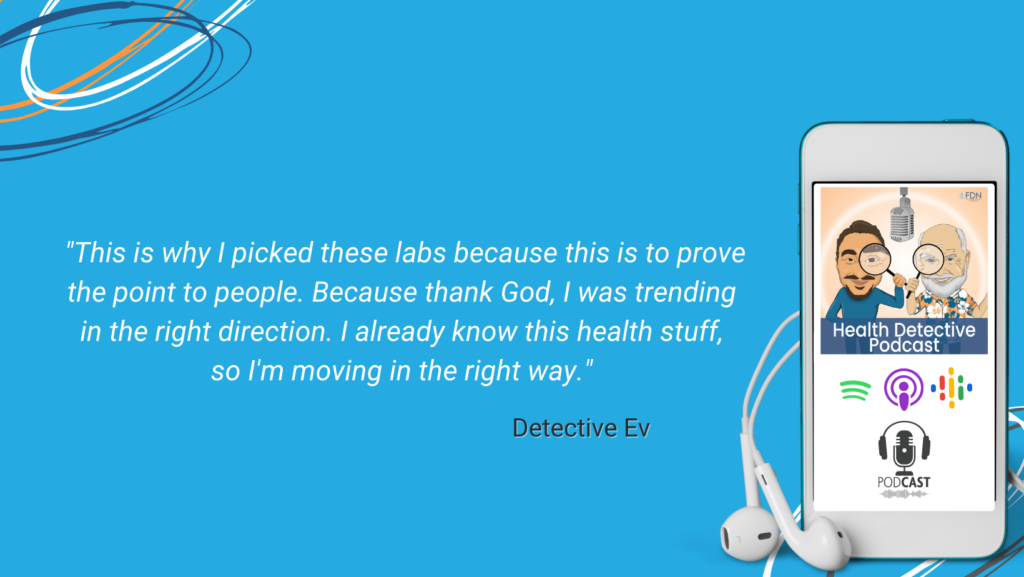
This is why I picked these labs because this is to prove the point to people. Because thank God, I was trending in the right direction. I already know this health stuff, so I’m moving in the right way.
Living As Optimally As Possible
But there’s many people that are sitting in this right now. And if you are lucky enough to get the full thyroid panel, which is a one in a hundred thousand circumstance, it seems, what wouldn’t have been shown here is that out of 1, 2, 3, 4, 5, 6, 7, 8, 9, 10 markers, 8 out of 10 of them did not pass a functional range. Yet everything came up fine.
It looks green for those on audio. Like in Western Medicine, this is all good. I never intended it for it to be that back in May of 2020. But this ends up being a perfect example of where Western falls really short with preventing these issues with people, in my opinion.
[00:50:19] Ryan Monahan: Yep. And you know, I’ll say again, I’d still give it like a B+. Nothing is dramatically off. But still, don’t we all want to achieve optimal health, not just kind of pretty good. Is that how you want to live your life? It’s good enough, right?

Maybe, I don’t want to pass judgment, for some people that might be perfectly fine. But for me personally, I am here to live an optimal life as much as possible. Most clients come to me because that’s what they’re looking for themselves as well. So that they can go out into the world and kick ass in their career, their family, travel, start a business. So that their health is not an obstacle that’s in the way of their being able to live the most fulfilling life possible.
Two Different Teaching Gifts
[00:50:58] Detective Ev: And speaking of clients, guys, obviously you can tell this, I think, if it’s your first time listening to Ryan, one, I tell you this all the time, my friend. Obviously, you’re brilliant. But then on top of that, you have the extra level of being able to teach this.
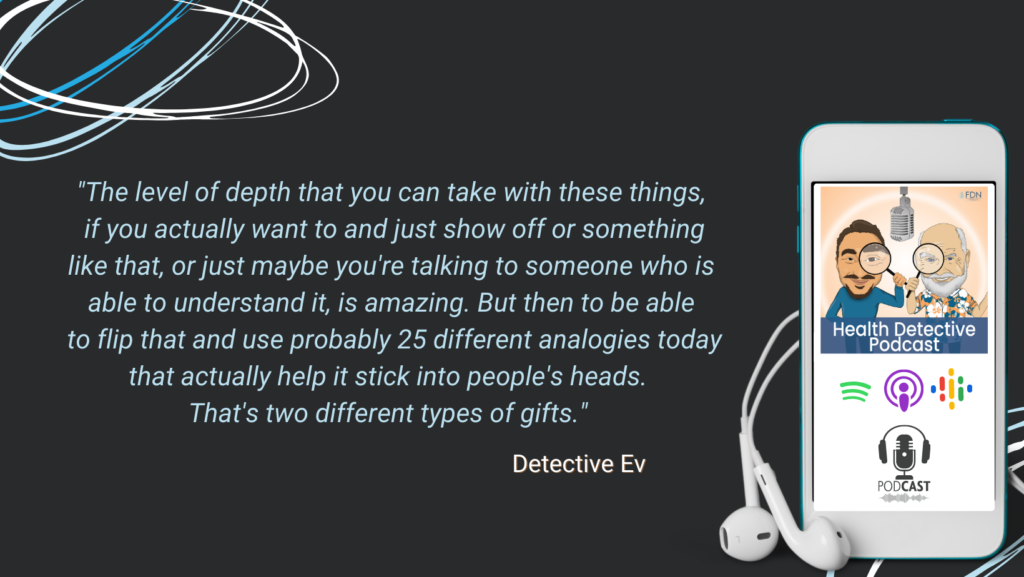
Because I have seen you when you’re just going off. The level of depth that you can take with these things, if you actually want to and just show off or something like that, or just maybe you’re talking to someone who is able to understand it, is amazing. But then to be able to flip that and use probably 25 different analogies today that actually help it stick into people’s heads. That’s two different types of gifts. So that’s very cool.
If someone wants to work with you and have those gifts used on their own case, where can they find you? And what’s your niche if you have one still to this day? Because I know you probably work with a lot of people.
Where to Find Ryan Monahan
[00:51:40] Ryan Monahan: For those that are interested in reaching out to me, asking a question, or potentially working together, they could find me at my website at themindfulnutrivore.com.
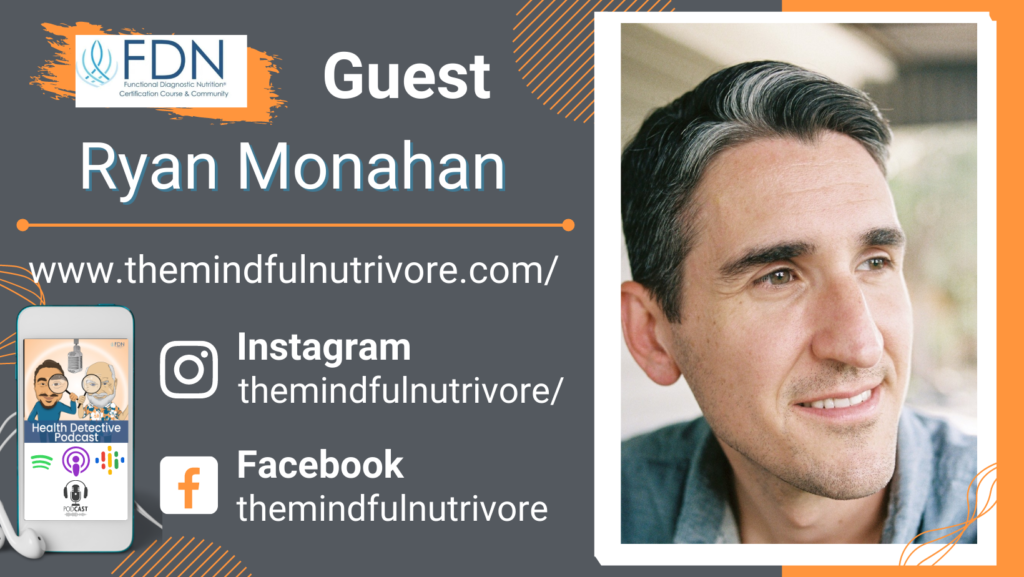
I actually have a biography, a video biography right on the homepage. That’s a great starting place. It’s about a five minute mini documentary about my own health journey. Definitely watching that, it was a labor of love. I worked with a close friend of mine that’s a cinematographer, so we got some really beautiful shots.
I have a services page on there that outlines like how I work, what my rates are, what those packages include.
You could also email me at Ryan@themindfulnutrivore if you are interested in setting up a free 20-minute consult. We can chat about your health history, can learn more about what your goals are, and we can see if we’d be a good fit to work together and kind of talk further about that.
Definitely available to work with folks that are interested.
[00:52:30] Detective Ev: And if you guys are going through the FDN course, this is someone, Ryan, that is, someone that you’ll see all the time once you graduate. He literally is in there constantly helping people. So, thank you so much for coming on today, my friend, and doing what you do.
[00:52:41] Ryan Monahan: Thanks so much, Evan. Glad to be here. Let’s do it again soon.
Conclusion
[00:52:43] Detective Ev: All right folks. That’ll do it for today’s episode with my friend Ryan Monahan. I hope you guys enjoyed listening to this one. This is a different format. We had tried it before and then the video didn’t work out because the person was on their phone and I was like, oh my goodness. Not Ryan, but someone else, our friend Barbara. We didn’t realize that it wouldn’t work on the phone, and we didn’t have the video of the labs despite her awesome analysis of my labs.
So, we hope you like this one. We are definitely going to do this in the future with other labs. Because you can listen to it if you want, but you can also get the video experience and really learn something on these types of episodes.

Let us know what types of labs you would like to see next. Would you like hormone testing, stool testing, functional blood chemistry? We can do it all at FDN. If you want to see those, drop me a comment on Podbean. Go to google and search for Podbean, the Health Detective Podcast. It’ll come right up and then you can leave a comment there.
I am looking forward to talking to you guys again soon, but until that day, take care.
You can always visit us at functionaldiagnosticnutrition.com.
To hire a coach, go to fdnthrive.com.
For a FREE Health Review, go to fdnthrive.com/match/.

